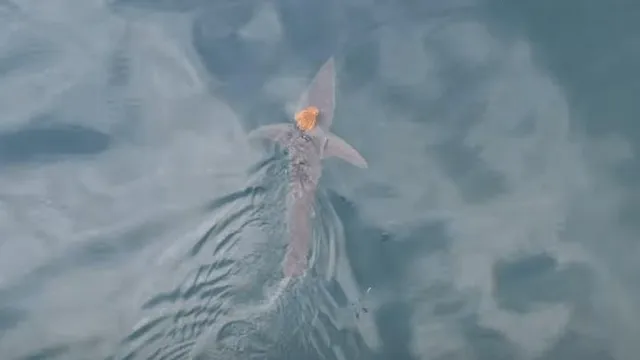
Octopus rides shark in shocking New Zealand encounter
2025-04-01 00:00- In December 2023, a research team in New Zealand captured footage of an octopus riding a shortfin mako shark.
- The observation occurred in the Hauraki Gulf, a region facing significant ecological threats.
- This encounter underlines the importance of marine conservation efforts to ensure the survival of unique species.
Express your sentiment!
Insights
In December 2023, marine biologist Professor Rochelle Constantine and her team from the University of Auckland were conducting research in the Hauraki Gulf, New Zealand. They were surprised to capture rare footage of a Maori octopus clinging onto the head of a shortfin mako shark while surveying the ocean. This unusual sight sparked curiosity among scientists, as the two species typically inhabit different environments. Shortfin mako sharks, known for being the fastest fish in the ocean, usually hunt at high speeds near the surface, while octopuses are bottom dwellers. The encounter lasted about 10 minutes without causing distress to the shark. The Hauraki Gulf is recognized for its diverse ecosystems, which face threats from human activities and climate change, making conservation efforts crucial. Scientists are seeking to understand how the octopus found itself on the shark, speculating that it could have been using the shark as a refuge from predators or as a means of transportation. The unique interaction, referred to as the
Contexts
Marine conservation is critical for maintaining the health of our planet and ensuring the sustainability of marine ecosystems. Oceans cover over 70% of the Earth's surface and are vital for the survival of countless species, including humans. They provide food, oxygen, and habitats for a plethora of organisms while also regulating the climate by absorbing carbon dioxide from the atmosphere. However, human activities such as overfishing, pollution, habitat destruction, and climate change have placed immense pressure on marine environments, leading to a decline in biodiversity and the degradation of oceanic health. Therefore, it is imperative to prioritize marine conservation efforts to mitigate these impacts and protect vital marine resources for future generations. One of the primary goals of marine conservation is to preserve the biodiversity of ocean ecosystems. Healthy marine environments support a wide array of species, each playing a unique role in the overall function of the ecosystem. For example, coral reefs, often referred to as the "rainforests of the sea," support a quarter of all marine species. Protecting these reefs through the establishment of marine protected areas (MPAs) can help mitigate the threats from overfishing and pollution, allowing ecosystems to recover and thrive. Additionally, preserving genetic diversity within marine species is essential for resilience against diseases, climate change, and habitat disruptions. Furthermore, marine conservation contributes significantly to human livelihoods and local economies. Millions of people rely on fishing and marine tourism as their primary sources of income. Unsustainable fishing practices not only threaten fish populations but also impact the economic stability of communities that depend on these resources. By adopting sustainable fisheries management practices and promoting ecotourism initiatives, we can ensure that both marine ecosystems and local economies flourish together. Investing in marine conservation also has long-term economic benefits, as healthy oceans can produce greater yields and support tourism, ultimately leading to a more stable food supply and job security. Lastly, addressing climate change is intrinsically linked to marine conservation efforts. Oceans act as carbon sinks, absorbing significant amounts of carbon dioxide, which helps to regulate global temperatures. However, increased levels of CO2 lead to ocean acidification, harming marine life, particularly coral reefs and shellfish. By implementing policies aimed at reducing greenhouse gas emissions and promoting renewable energy sources, we can help alleviate the impacts of climate change on marine ecosystems. Public awareness and scientific research play pivotal roles in informing and executing effective conservation strategies. Engaging communities and stakeholders in marine conservation initiatives fosters a shared sense of responsibility and encourages collaborative efforts towards the preservation of our oceans.